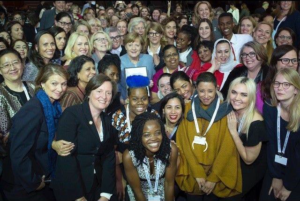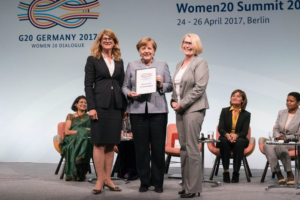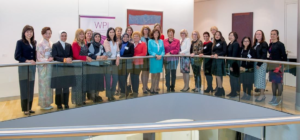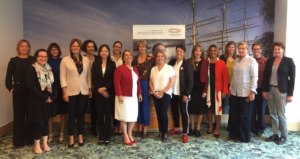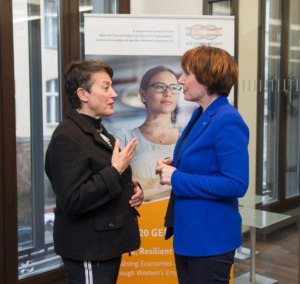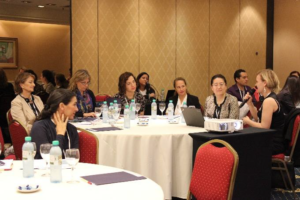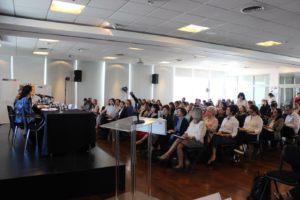Women20 as International Implementation Partner
Background
Diversity and full participation are es-sential for fostering resilient, sustaina-ble and viable economies and socie-ties. Equal rights and women’s eco-nomic empowerment are thus funda-mental for a prosperous world and so-cial development.
The Women20 (W20) is an official G20 dialogue process that seeks to pro-mote gender equality and women’s economic empowerment by bringing together the needs and interests of civil-society women’s organisations, business women’s organisations, and female scientists and academics around the world. Under the German G20 presidency, the W20 is jointly organized by the National Council of German Women’s Organisations (Deutscher Frauenrat) and the Association of German Women Entrepreneurs (Verband deutscher Unternehmerinnen − VdU). In a broad dialogue using digital tools, expert meetings and roundtables as well as the W20 Summit, W20 connects the global experiences of women’s civil society organisations and women’s entrepreneur associations to implement strong recommendations within the G20 negotiations.
During the German presidency in 2017, W20 focusses on four main topics: labour market in-clusion, financial inclusion, digital inclusion and strengthening the W20 engagement process.
Objectives and Activities of the Project “GIZ/EMSD – Implementation Partnership with W20”
The Emerging Market Sustainability Dialogues (EMSD) is an IZR-title and part of the group G410 Global Policy. EMSD is a network of change agents and decision makers from think tanks, multinational corporations, and the financial sector. We jointly develop and implement solutions for sustainable economic development in emerging economies through consulta-tion, dialogue, and research. Its aim is to have emerging markets and sustainability perspec-tives reflected in international policy processes.
EMSD serves as international implementation partner of W20 Germany providing both intel-lectual and organisational support. The main goal of the partnership is to establish a transpar-ent and inclusive W20 dialogue and influence the German G20 negotiations. EMSD helped the partners in creating a sustainable and viable W20 network and ensuring that perspectives of women from emerging economies are included. Furthermore, the partnership seeks to in-crease visibility of women’s empowerment issues within the G20 and the public in general and strengthen the cooperation between different stakeholders from civil society, the private and public sector as well as academia to advocate for gender equality and women’s empowerment.
Joint activities included:
Support for establishment of a W20 Delegates Network (through GIZ country offices and the EMSD network),
Conceptual design and execution support for international consultation process, in-cluding digital solutions which resulted in the W20 Communiqué,
Facilitation of a roundtable on digitalisation with all G20 engagement groups, which resulted in a joint B20, T20, W20 declaration on „Ensuring Inclusiveness in a Digital-ized World”,
W20 Study on ‘The Effects of Digitalisation on Gender Equality in the G20 Econo-mies’ that delivered contents for the demands in the W20 Communiqué,
W20 outreach to the next presidency Argentina, including digitalisation focus
Joint organisation of the W20 summit – preparation of agenda, panels, and ensuring emerging markets perspectives and participation,
Organisation of the first All-W20-Presidencies Roundtable,
Conceptual preparation of the hand-over from W20 Germany to W20 Argentina
Preparation of follow-up activities from the G20 communiqué on Women Entrepre-neurs Finance Initiative (We-Fi) with a joint event at the WB/IMF-Civil Society Policy Forum „Women20 targeting financial inclusion in the G20 and beyond: The „Women Entrepreneurs Finance Initiative (We-Fi)”,
Proposal for design and implementation of the Business Women Leaders Taskforce.
Results and Achievements
The efforts led to the W20 Summit, which took place in Berlin from April 24-26, 2017, where the W20 Communiqué was handed over to Angela Merkel in her current role as President of the G20. More than 400 partici-pants joined the summit, which received high media interest from around the world.
The Communiqué (and an accompanying Implementation Plan) demanded commit-ment of the G20 leaders to women’s eco-nomic empowerment, particularly through:
Systematic integration of gender analysis into all decision making,
Advancing economic gender equality, specifically close the labour participation gap in the framework of the ‘25% by 2025 target’,
Support for women entrepreneurs and female cooperatives,
Foster economic opportunities for women in STEM fields and bridging the digital gender divide,
Access of W20 to G20 negotiation tracks and Sherpa Meetings.
As a great success, issues of women’s empowerment have been placed firmly in the center of the G20 agenda. The G20 leader’s communique reflected all five demands made by the W20, and specifically addressed the three core topics of the W20 (labour market inclusion, financial inclusion and digital inclusion). In particular, the leaders committed to set up and promote initiatives to tackle the issues, namely the Initiative #eSkills4Girls, the Women En-trepreneurs Finance Initiative (We-Fi) and the Business Women Leaders’ Taskforce.
Ongoing Cooperation
Building on these successes the long-term goal is to establish a strong Women20 network, foster W20 process coherence beyond the German presidency and follow-up on this year’s G20 outcomes (in particular the set-up of the initiatives) to advance the goal of gender equal-ity and women’s empowerment. A starting-point for future cooperation was the first All-W20 Presidencies roundtable organised by EMSD. The event brought W20 presidencies from Tur-key, China, Germany and Argentina together with organisations such as the OECD and the Think Tank Chatham House. At the event, a number of follow-up measures were discussed. EMSD presented a proposal for an operational structure, which was highly welcomed by all participants and will be further developed by W20 Germany to be presented at the W20 Ar-gentina Kick-off. The OECD committed to host consultations for W20, analogous to its work with Business20 (B20). Finally, follow-ups on the G20 initiatives We-Fi and Business Women Leaders’ Task Force were discussed. This included a paper of W20 recommendations to-wards the World Bank and other relevant institutions regarding the set-up of the We-Fi. EMSD is involved in all of these processes and seeks to continue the successful partnership, not only with W20 Germany but with the upcoming Argentinian W20 presidency as well.
Results-based Monitoring
In cooperation with W20, a handbook with lessons-learnt and best-practices for future W20 processes is developed which evaluates the successes of the project and points to potential improvements and challenges for future W20 presidencies. The handbook will be publicly available. The above-mentioned, intended operational support structure of W20 would also be responsible for results-based monitoring and evaluation. This includes tracking of the im-plementation progress of initiatives committed to by the G20 leaders as well as key perfor-mance indicators of W20 such as the “25 by 25” target. Within GIZ, the results of the work for gender equality with W20 are part of EMSD’s regular results-based monitoring.
Entry for the GIZ Gender Competition 2018, submitted by Nina Roth and Katharina Stahlecker (G410,
Emerging Market Sustainability Dialogues)

 GIZ Gender Website
GIZ Gender Website